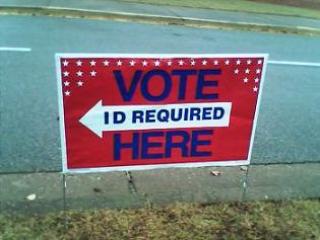The Internet tubes are abuzz over a highly controversial op-ed piece penned by contributing RP and former Alabama Congressman Artur Davis in the Montgomery Advertiser. As you can read below, Davis has changed his mind from formerly opposing a voter identification law in his home state. As always, we encourage a healthy debate, and your opinions are welcome in the comments section below:
 I’ve changed my mind on voter ID laws — I think Alabama did the right thing in passing one — and I wish I had gotten it right when I was in political office.
I’ve changed my mind on voter ID laws — I think Alabama did the right thing in passing one — and I wish I had gotten it right when I was in political office.
When I was a congressman, I took the path of least resistance on this subject for an African American politician. Without any evidence to back it up, I lapsed into the rhetoric of various partisans and activists who contend that requiring photo identification to vote is a suppression tactic aimed at thwarting black voter participation.
The truth is that the most aggressive contemporary voter suppression in the African American community, at least in Alabama, is the wholesale manufacture of ballots, at the polls and absentee, in parts of the Black Belt.
 Voting the names of the dead, and the nonexistent, and the too-mentally-impaired to function, cancels out the votes of citizens who are exercising their rights — that’s suppression by any light. If you doubt it exists, I don’t; I’ve heard the peddlers of these ballots brag about it, I’ve been asked to provide the funds for it, and I am confident it has changed at least a few close local election results.
Voting the names of the dead, and the nonexistent, and the too-mentally-impaired to function, cancels out the votes of citizens who are exercising their rights — that’s suppression by any light. If you doubt it exists, I don’t; I’ve heard the peddlers of these ballots brag about it, I’ve been asked to provide the funds for it, and I am confident it has changed at least a few close local election results.
There is no question that a voter ID law, in order to pass legal muster and in order to be just, must have certain characteristics. It should contain exceptions for the elderly or disabled who may not drive, and as a consequence lack the most conventional ID, a driver’s license. There should also be a process for non-drivers to obtain a photo ID, and the process has to be cost-free, for the simple reason that even a nominal financial impediment to voting looks and feels too much like a poll tax.
It is my understanding that the Alabama statute contains each of these exceptions and a few others, including a provision for on-site polling officials to waive the requirement if they attest that they know the voter.
The fact that a law that is unlikely to impede a single good faith voter — and that only gives voting the same elements of security as writing a check at the store, or obtaining a library card — is controversial does say much about the raw feelings in our current politics. The ugliest, hardest forms of disfranchisement were practiced in our lifetimes, and its still conventional rhetoric in black political circles to say those times are on the way back. Witness a last-minute automated call to black voters in the 2010 general election by state Sen. Hank Sanders, an ingenious lawyer and a skillful legislator who knew better, but who also knew the attack would resonate.
It also does not help matters that Alabama has become a state where in a general election, race is a prohibitive indicator of how 2.5 million registered voters routinely behave. If in 2008 or 2010, you had observed a white Alabamian standing in line in any precinct in the state, and you had guessed he or she was voting Republican, you had an 80 percent chance of getting it right — there are few safer bets in politics, other than the near 100 percent certainty that an African American standing in the same line is about to vote Democratic.
Given those racial realities, any effort to regulate voting by a Republican-dominated Alabama Legislature will draw inevitable scrutiny. And Alabama hardly boosts its cause by passing an immigration law that ratifies every national jibe about us, and that has no real effect beyond putting a social fence around a certain class of Latinos. But demanding integrity in voting is neither racist, nor raw party politics.
It is interesting that with a few exceptions that reflect political pressures I understand pretty well, the new Alabama ID law still has not become that much of a political football. The same can’t be said in other states or at the national level. I was disappointed to see Bill Clinton, a very good president and an even greater ex-president, compare voter ID to Jim Crow, and it is chilling to see the intimidation tactics brought to bear on African American, Democratic legislators in Rhode Island who had the nerve to support a voter ID law in that very liberal state.
The case for voter ID, however, is a good one, and it ought to make politics a little cleaner and the process of conducting elections much fairer. I wish I’d gotten it right the first time.









Leave a Reply